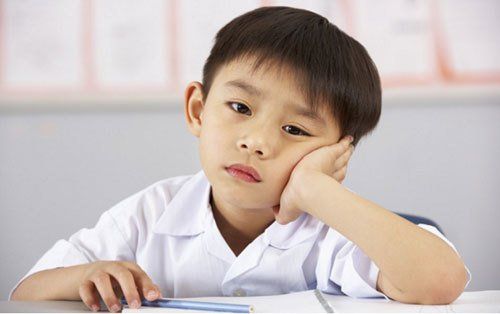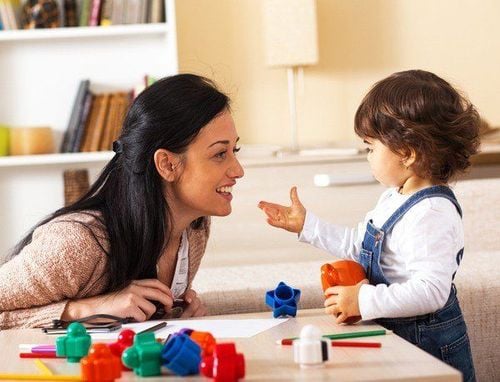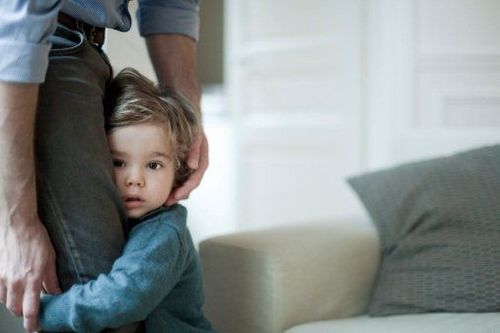This is an automatically translated article.
When a child tosses in a chair and isn't paying attention, we tend to think of attention deficit hyperactivity disorder (ADHD), but anxiety can also be to blame. When children are anxious when going to school, it can be difficult for children to focus on lessons and skip teachers' lectures because anxious thoughts are overwhelming their brains. School anxiety is a concern for children and a concern for parents. It's very common, but it's not always the same. Sometimes it turns into illnesses like depression, behavioral disorders, emotional disturbances. In this article we will provide useful information to help you better understand your child's anxiety at school.
1. Is it normal for children to be anxious when going to school?
The answer confirmed by experts is yes. Some anxiety is a normal part of a baby's behavioral and emotional development. Younger students often have a lot of anxiety about school, their ability to get along with their classmates, and their ability to please their parents. If your child feels he's having trouble completing any of the above, it could be a sign of school anxiety. Children may also have some reaction to stresses that arise in their own family such as parents' divorce, financial difficulties, illness, or even unpleasant news that is still coming. present in the everyday world.
While it's difficult for parents to see their child's anxiety through their outward appearances, it's important to remember that anxiety is a normal part of a child's life. Worrying can even have a number of benefits, such as keeping children alert to potentially dangerous situations and encouraging positive behaviors in response to challenges that are presented to them. in daily life. However, extreme anxiety can cause undue stress for both children and their families.

Sự lo lắng khi đi học là điều bình thường trong cuộc sống của trẻ
2. Types of anxiety children often face when going to school
Here are some common forms of anxiety among school-age children:
Anxiety over separation from parents. While this type of anxiety is common in infants and toddlers, the fear of being separated from parents and loved ones can make a bad impression on the first day of school. children, especially when they are facing a big change such as starting school or the first day after moving to a new school. The path to independence isn't easy and it can be both exciting and nervous for a child to take those first steps away from parents and loved ones. Fears: Children aged 5-8 often worry about things they have seen, done, and disliked, heard from friends, learned at school, or learned about through the media. These fears are quite diverse, and can include scenes in a clinic or medical facility with doctors and tools in hand, scenes of vampires, meteors, or a worthy show. Another fear that the child has hidden his parents to see. For example, a sci-fi movie that deals with the devastation of tornadoes at school can cause children to develop fears about natural disasters. Likewise, a child may develop a fear of flying after hearing news of a plane crash on TV. Common fears and phobias for children include fear of spiders, fear of heights, fear of bacteria, and fear of water. In addition, some children also feel very afraid of dogs if they are bitten or barked when they come near. Social anxiety. Kindergarten and elementary schools can be more demanding of their students socially. Children can be nervous about new situations as well as new friends. Fighting with friends or trying to find a suitable friend to share the lunch table with can also lead to anxiety for children. Avoid going to school. If your child often complains, constantly complains of stomach pain as an excuse to miss school, it is a sign that the child is trying to avoid something or someone at school. Maybe your child is being teased by friends, is upset about something at school, or wants to skip an upcoming boring program. However, if it is indeed the child that has colic or is experiencing some other worrisome symptom, parents should take the child to a medical facility to be examined and ruled out medical conditions or to try to find a cure. understand if something unusual is going on.

Chương trình học nhàm chán khiến trẻ thường xuyên kiếm lí do trốn tránh việc đi học
3. Helping school-age children manage anxiety
When the child shows anxiety or stress, comfort the child. However, do not stop there, parents, let's come up with some ways to help children cope and overcome their fears. Here are a few tips that can be helpful for young parents:
Acknowledge the fear. Everyone has their own fears, so don't take your child's fears for granted, they can be completely normal and reasonable. For example, if your child is afraid of losing you in the store, tell him that you share those same fears. That will help the child feel empathy. Explain why parents need to keep a close eye on their children and teach them what to do if they get lost. If your child is worried because they can't complete their homework as quickly as their classmates, remind them that each child has his or her own pace of learning. Let them know that as long as they try their best, no one will be disappointed with them. Talk about your fears. One simple way to alleviate an overwhelming fear is to speak out about your fears. By talking about it, children can form healthier views about fear, and they can give parents the information they need to help them manage their fear. For example, if someone says something bad about a child at school and the child goes home and tells the parents. Teach your child what to do when it happens again. Let your child know that you are confident in his ability to handle all situations encountered in life. Reduce the load of some activities for children. Some children may be trying to tell their parents that they are worried by the demands of school, music and sports lessons. Consider whether your child is overloaded with extracurricular activities or chores at home. Ask children how they want to reduce their load so that they have a reasonable way to arrange and sign up for extra-curricular classes for them. Help your child overcome anxiety with humor. Laughter always helps to reduce anxiety. If your child is wondering about a performance or role she will take on in the next class play. Tell your child some funny stories. These stories put things into perspective and if children learn to smile in awkward moments, it will boost their confidence.

Cha mẹ có thể giúp trẻ vượt qua cảm giác lo lắng bằng sự hài hước
4. When to seek professional help
For most children, occasional worries are a manageable fact of life. Uncontrollable worries can turn into a big obstacle. Seek medical help if your child's anxiety may interfere with family activities or prevent your child from making friends, become a reason for your child not wanting to go to school, disrupt Sleep disrupts the baby's sleep and leads to compulsive behaviors or physical symptoms.
If needed, doctors can refer children to family counselors or child psychiatrists or seek out child psychotherapists.
Like all adults, children have their own worries and stresses, especially during school age. Worrying about the amount of homework that needs to be completed, the ability to fit in with friends or the difficulty of some teachers can make children feel stressed. However, these are completely normal and every child needs to pay for it. But if those worries interfere with the normal functioning of the child and family or cause other physical symptoms, the child may need to seek medical attention for psychological treatment.
If you have a need for medical examination at Vimec Health System nationwide, please make an appointment on the website to be served.
Please dial HOTLINE for more information or register for an appointment HERE. Download MyVinmec app to make appointments faster and to manage your bookings easily.
Reference sources: babycenter.com, scholastic.com













